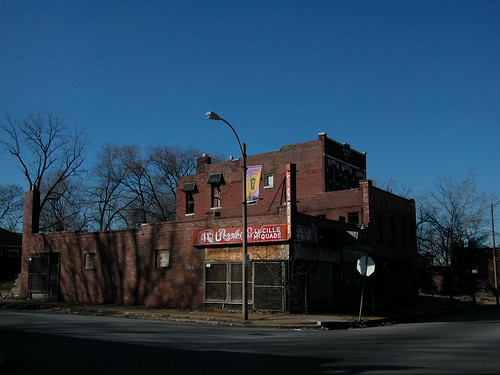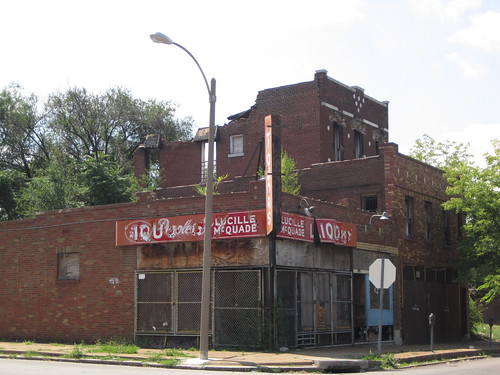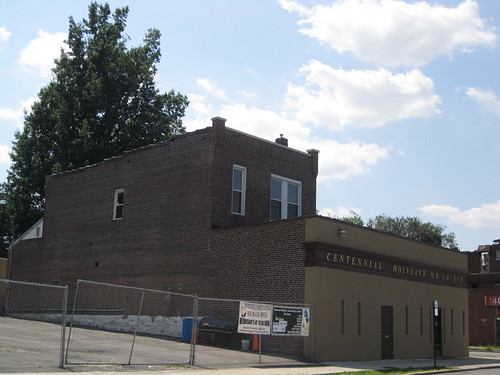
The striking group of vacant buildings at the northwest corner of West
Florissant and Linton Avenues (3900-4 West
Florissant Avenue, technically) in the Fairgrounds neighborhood has long attracted the attention of photographers, amateur architectural historians and passer-by. The colorful name on the liquor store sign at the corner, Lucille
McQuade, tempts the imagination to conjure Lucille. Sassy liquor store owner, sitting behind the corner with a quick no bullshit face for the teenagers trying to buy a Colt? I don't know, but I do know Lucille's old store is not long for this world.

Two years have passed since I took the first photograph in this post. The three buildings now look even worse. Well, the corner building (built in 1933) is same and sound, although the enamelled sign board has been crumpled by a would-be thief. The two-story house, built in 1896, was first robbed of limestone keystone and
voussoirs above the second floor windows. Then came the fire in May of this year that triggered collapse of most of the building structure. The formal front elevation struggles to maintain its composure, and the side walls are largely intact. However, anything wooden has fallen down where gravity has lured all buildings forever.

Yet all is not lost, because the house's commercial front (built some time after 1933) is intact. This front actually covers the front and wraps around the side. Bricks from the house have fallen through the roof, perhaps, but this fireproof building addition is intact and could be rescued from its crippled parent. The pale-toned tapestry brick and the
terra cotta shields are particularly bright on this building. Notice how the new front is built over the pier of the one-story corner store, which shares some of its vocabulary.

If we lose the buildings on one side of Linton, we have two other storefront additions on the other. United Railways built a street car line on West
Florissant between 1910 and 1915, and as residents of older neighborhoods like Old North and Hyde Park moved in this direction, there was demand for more retail. The residential buildings around this intersection were located near earlier commercial buildings, and adaptation into commercial use was logical for owners. The tenement building above, located at 3856 West
Florissant Avenue, was built in 1890 and built out to the sidewalk with a store in 1927.

On the same block at the alley line is the building at 3848 West
Florissant Avenue. The house is a small brick shaped-parapet structure on a raised foundation dating to 1892. The commercial addition dates to some time after 1910. Use has come full circle, as the storefront is now used as a residence.
 The striking group of vacant buildings at the northwest corner of West Florissant and Linton Avenues (3900-4 West Florissant Avenue, technically) in the Fairgrounds neighborhood has long attracted the attention of photographers, amateur architectural historians and passer-by. The colorful name on the liquor store sign at the corner, Lucille McQuade, tempts the imagination to conjure Lucille. Sassy liquor store owner, sitting behind the corner with a quick no bullshit face for the teenagers trying to buy a Colt? I don't know, but I do know Lucille's old store is not long for this world.
The striking group of vacant buildings at the northwest corner of West Florissant and Linton Avenues (3900-4 West Florissant Avenue, technically) in the Fairgrounds neighborhood has long attracted the attention of photographers, amateur architectural historians and passer-by. The colorful name on the liquor store sign at the corner, Lucille McQuade, tempts the imagination to conjure Lucille. Sassy liquor store owner, sitting behind the corner with a quick no bullshit face for the teenagers trying to buy a Colt? I don't know, but I do know Lucille's old store is not long for this world. Two years have passed since I took the first photograph in this post. The three buildings now look even worse. Well, the corner building (built in 1933) is same and sound, although the enamelled sign board has been crumpled by a would-be thief. The two-story house, built in 1896, was first robbed of limestone keystone and voussoirs above the second floor windows. Then came the fire in May of this year that triggered collapse of most of the building structure. The formal front elevation struggles to maintain its composure, and the side walls are largely intact. However, anything wooden has fallen down where gravity has lured all buildings forever.
Two years have passed since I took the first photograph in this post. The three buildings now look even worse. Well, the corner building (built in 1933) is same and sound, although the enamelled sign board has been crumpled by a would-be thief. The two-story house, built in 1896, was first robbed of limestone keystone and voussoirs above the second floor windows. Then came the fire in May of this year that triggered collapse of most of the building structure. The formal front elevation struggles to maintain its composure, and the side walls are largely intact. However, anything wooden has fallen down where gravity has lured all buildings forever. Yet all is not lost, because the house's commercial front (built some time after 1933) is intact. This front actually covers the front and wraps around the side. Bricks from the house have fallen through the roof, perhaps, but this fireproof building addition is intact and could be rescued from its crippled parent. The pale-toned tapestry brick and the terra cotta shields are particularly bright on this building. Notice how the new front is built over the pier of the one-story corner store, which shares some of its vocabulary.
Yet all is not lost, because the house's commercial front (built some time after 1933) is intact. This front actually covers the front and wraps around the side. Bricks from the house have fallen through the roof, perhaps, but this fireproof building addition is intact and could be rescued from its crippled parent. The pale-toned tapestry brick and the terra cotta shields are particularly bright on this building. Notice how the new front is built over the pier of the one-story corner store, which shares some of its vocabulary. If we lose the buildings on one side of Linton, we have two other storefront additions on the other. United Railways built a street car line on West Florissant between 1910 and 1915, and as residents of older neighborhoods like Old North and Hyde Park moved in this direction, there was demand for more retail. The residential buildings around this intersection were located near earlier commercial buildings, and adaptation into commercial use was logical for owners. The tenement building above, located at 3856 West Florissant Avenue, was built in 1890 and built out to the sidewalk with a store in 1927.
If we lose the buildings on one side of Linton, we have two other storefront additions on the other. United Railways built a street car line on West Florissant between 1910 and 1915, and as residents of older neighborhoods like Old North and Hyde Park moved in this direction, there was demand for more retail. The residential buildings around this intersection were located near earlier commercial buildings, and adaptation into commercial use was logical for owners. The tenement building above, located at 3856 West Florissant Avenue, was built in 1890 and built out to the sidewalk with a store in 1927. On the same block at the alley line is the building at 3848 West Florissant Avenue. The house is a small brick shaped-parapet structure on a raised foundation dating to 1892. The commercial addition dates to some time after 1910. Use has come full circle, as the storefront is now used as a residence.
On the same block at the alley line is the building at 3848 West Florissant Avenue. The house is a small brick shaped-parapet structure on a raised foundation dating to 1892. The commercial addition dates to some time after 1910. Use has come full circle, as the storefront is now used as a residence.





No comments:
Post a Comment